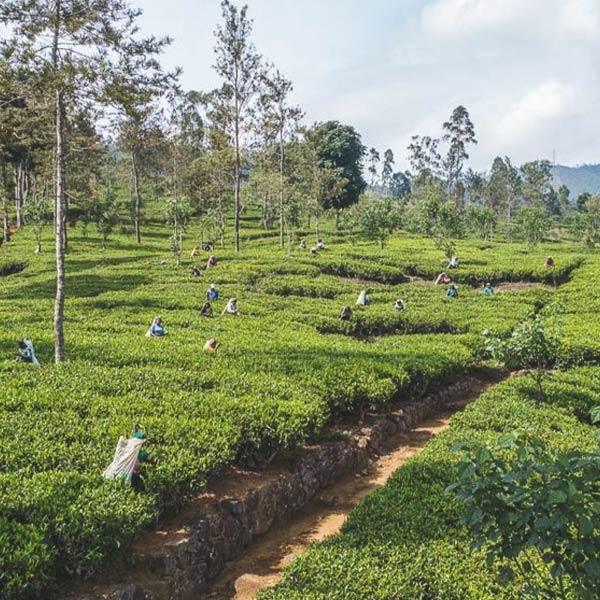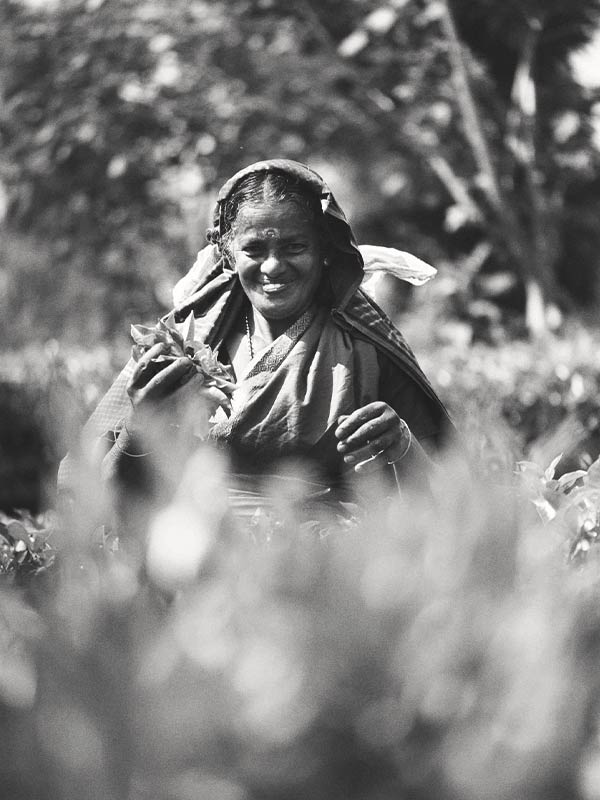Home / Loose Leaf / Black Tea
44p per cup
Couldn't load pickup availability
A rich loose leaf black tea from an independent family farm in the cool mountains of Nuwara Eliya.
Tasting Notes
Tasting Notes
A pure, loose leaf black tea with flavours of burnt sugar, hay, butterscotch and fresh cardamon pods. Smooth tannins and delicate floral top notes. Equally delicious enjoyed on its own or with milk. You might be surprised that the pale golden cup can handle milk, but although the colour may be light, the flavour is rich and robust. A decent dollop of milk reveals notes of marzipan and butterscotch.
Cost Per Cup
Cost Per Cup
44p per cup based on 2.5g of tea per 150ml of water and 2 infusions.
Origin
Origin
Nuwara Eliya District, Central Province, Sri Lanka
Share
Recommended Infusion Guide
-

Quantity
Use 2.5g of tea per 150ml of water.
-

Temperature
For the optimum infusion use 85°C water. To take with milk, please use water at 100°C. We recommend trying both!
-

Time
Infuse for 60 - 90 seconds if having black, or 3 - 4 minutes if having with milk.
-

Infusions
You can infuse this tea at least twice at lower temperatures, and once if having with milk. With each careful infusion, different subtleties of flavour are revealed.
-

Quantity
Use 0.1 oz of leaf per 5.1 fl oz of water.
-

Temperature
For the optimum infusion use 185°F water. To take with milk, please use water at 212°F. We recommend trying both!
-

Time
Infuse for 60 - 90 seconds if having black, or 3 - 4 minutes if having with milk.
-

Infusions
You can infuse this tea at least twice at lower temperatures, and once if having with milk. With each careful infusion, different subtleties of flavour are revealed.
-

Quantity
Use 1 heaped tsp. per 150ml of water.
-

Temperature
For the optimum infusion use 85°C water. To take with milk, please use water at 100°C. We recommend trying both!
-

Time
Infuse for 60 - 90 seconds if having black, or 3 - 4 minutes if having with milk.
-

Infusions
You can infuse this tea at least twice at lower temperatures, and once if having with milk. With each careful infusion, different subtleties of flavour are revealed.
More infusion tips
How to infuse your tea is very personal, and these are just our recommendations based on experience. Please experiment with these variables to your heart's delight. These are our recommendations, not hard and fast rules. The most delicious tea is the one you love.
Our guide uses a standard tea cup size (150ml/5.5 oz) as a measure, please adjust the quantity of leaf accordingly for less or more water. Our whole loose leaves are of such a high quality that you can infuse our teas at least twice, and the second infusion is often better than the first, with different flavours revealed as the leaf softens. If you prefer your tea stronger, add more leaf, don’t leave it for longer (this will just make it bitter).
The Diyanillakelle tea garden extends over a 225-acre expanse of land in Lindula within the Nuwara Eliya District of Sri Lanka. The garden is classified under the Up-country Wet Zone agro-ecological region, situated at 4,500ft altitude and the average temperature is between 22°C to 26°C.
Diyanillakelle has an extensive history of tea cultivation spanning 150 years. Having been run for a significant period of time by its original Scottish planters, the garden passed hands through successive Sri Lankan owners until in 2012 when Ananda took over.
“
"The fields down to every tea bush have been given careful attention. The factory has been rebuilt, refitted, and transformed to a high quality and low quantity production line featuring custom made troughs and rollers and electric dryers. Branching away from producing mass produced tea to high quality low volume tea also means we can ensure that our workers enjoy better working conditions - from reduced working hours to vastly improved pay that is not linked to plucking volumes. We have also spent time upskilling our workers on fine plucking, and some are now spending time in the factory as apprentices learning the fine tea manufacturing processes. Furthermore, all our tea sales now include a 'community elders provision' of $5 per kilo to establish and run a facility to care for retired/elderly members of our garden community. Diyanillakelle is now a sustainable and ethical agro-enterprise focused only on producing the highest quality tea that can compete with the best tea in the world."
”
- Ravindu, Ananda's son-in law
We have been working with Ravindu for many years to bring you this wonderful tea. The farm Ananda took over was a conventional tea farm that they set about transforming. Conventional is used to describe farming practices that use industrial pesticides, herbicides and fertilisers. It is our fervent hope that this is not our future; that convention - the way in which things are usually done - becomes something far more sustainable for the land and the people that live and work on it to survive and thrive into the future(please see our section on organic tea farming here). Ananda, Ravindu and the team at Diyanillakelle have the same vision.
He wanted the farm to be environmentally, socially and economically viable for the community. Across Sri Lanka and India high-volume, conventional tea farming is becoming increasingly unsustainable. International commodity tea prices keep dropping, forcing farms into producing more industrial and lower grade teas, which in turn become increasingly less valuable. It’s a vicious circle that forces farms into low wages and communities into poverty.
Like Ananda and Ravindu, this is a cycle we want to break.

We work with tea farms across the world and are able to share best practices, skills and expertise between our collaborative tea community. Nayan, the wonderful woman tea farmer who makes our Indian Cloud tea shared some of her story of creating an organic tea garden and put Rav in contact with a brilliant tea maker, Nalin who had helped her in the past.
With the help of the independent tea community, stepping outside conventional "Big Tea" plantations he and his family are painstakingly shaping a beautiful future.
They have put their faith in a sustainable future that needs all of our support. But what a delicious way to change the world, a little bit, for the better.

It was not just the land that Ananda, Ravindu and the rest of the family converted, but the craft of tea making.
With the help of global experts, a brilliant team on the ground, and a huge amount of hard work and experimentation they are now making much smaller amounts of high quality tea, rather than trying to churn out large amounts for diminishing returns.
This puts a huge amount of faith in the tea drinking community - YOU. No pressure!
After many years of development and investment, heartache and tremendous hard work - we are so proud to bring you this delicious tea.
Shipping, delivery & more...
US Shipping Information
FREE DHL Tracked/DHL Plus Tracked when you spend $30 or more
DHL Tracked/Plus Tracked from £4.99
USPS Priority from £8.99
FedEx Home Delivery from £16.99
*Subject to next day cutoff and postcode location. Availability of rates depends on location and order weight. For a complete overview of our shipping rates please see our delivery page.
All prices quoted in GBP and will be converted to your local currency if available.
Returns
The Rare Tea Lady believes that our teas are some of the greatest in the world, and that our range and service are second to none.
In the isolated case that you are not completely satisfied with any tea or teaware you purchase from our website, please get in contact with our customer services team to discuss returning your order.*
In most instances we will give you a full refund of the item’s cost excluding postage. We may ask you to return the item to us. Customers in the European Union have a statutory cooling-off period of fourteen days that is not affected by this guarantee, but any tea pouches much remained sealed for this to be in effect.
*We only accept returns/refunds for tea within two months of receipt, because it is impossible for us to know if the tea has been stored correctly.

















